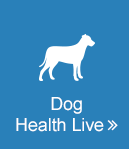Food Allergies in Dogs
Dogs with food allergies suffer from a variety of skin issues ranging from itchy, flaky skin to redness and hair loss. Other less obvious signs of food allergies can include itchy ears, infected ears and inflamed paws. Allergies are intense sensitivities to proteins from the food they eat. Normally these ingredients are not harmful to dogs, but some individuals react to the substances as dangerous. The immune system responds to the perceived threat by releasing histamines that cause inflammation, swelling and itching symptoms. It is important to note that allergies are not the same thing as sensitivities. Sensitivities occur when certain foods make dogs vomit or give them diarrhea. While the trigger food makes the dog sick and should be avoided, it does not cause an actual allergic response.
If you notice signs of allergies in your dog you should talk to your veterinarian about investigating your dog’s diet. Food allergies are caused by proteins so your vet will be able to prescribe a bland, hydrolyzed “allergen free” diet. This type of diet is not ideal for long term use because they are expensive and not very tasty, but it is really the only way to eliminate all allergens to see if that solves the issue. Be mindful not to give your dog any treats or access to any other food during this phase of the investigation because any ingredient could be the allergen culprit. Once you can determine that something in the diet was causing your dog’s allergies, you can start adding different ingredients back to the diet, one per week. When the dog’s allergy symptoms return you will have found the problem and know what ingredient(s) to avoid.
Because food allergies have become much more common, pet food companies offer a variety of options that are free of common allergens such as chicken, turkey, beef or grains. Many pet parents are concerned that their dog is allergic to ingredients like corn or wheat gluten, but these allergies are not very common for dogs. Dogs evolved to be carnivores so they should be eating diets that are primarily meat. Many popular commercial diets list corn or other fillers as the main ingredient. Corn is not very nutritious for dogs so you will probably notice poor skin and coat condition in your dog if they are eating this type of diet, but that is due to nutritional deficiency – not allergies. Switching to a healthier food that provides nutritious meat and vegetables will help clear up your dog’s coat, but that does not mean that trace amounts of corn in treats or supplements need to be avoided. It is like if a human ate French fries for the majority of their diet. They would become very unhealthy and their skin would look terrible, but the occasional serving of French fries with an otherwise healthy diet does not present a problem.
Studies

